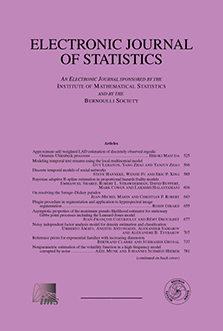Abstract
This study aims at contributing to lower bounds for empirical compatibility constants or empirical restricted eigenvalues. This is of importance in compressed sensing and theory for $\ell_{1}$-regularized estimators. Let $X$ be an $n\times p$ data matrix with rows being independent copies of a $p$-dimensional random variable. Let $\hat{\Sigma}:=X^{T}X/n$ be the inner product matrix. We show that the quadratic forms $u^{T}\hat{\Sigma}u$ are lower bounded by a value converging to one, uniformly over the set of vectors $u$ with $u^{T}\Sigma_{0}u$ equal to one and $\ell_{1}$-norm at most $M$. Here $\Sigma_{0}:=\mathbb{E} \hat{\Sigma}$ is the theoretical inner product matrix, which we assume to exist. The constant $M$ is required to be of small order $\sqrt{n/\log p}$. We assume moreover $m$-th order isotropy for some $m>2$ and sub-exponential tails or moments up to order $\log p$ for the entries in $X$. As a consequence, we obtain convergence of the empirical compatibility constant to its theoretical counterpart, and similarly for the empirical restricted eigenvalue. If the data matrix $X$ is first normalized so that its columns all have equal length we obtain lower bounds assuming only isotropy and no further moment conditions on its entries. The isotropy condition is shown to hold for certain martingale situations.
Citation
Sara van de Geer. Alan Muro. "On higher order isotropy conditions and lower bounds for sparse quadratic forms." Electron. J. Statist. 8 (2) 3031 - 3061, 2014. https://doi.org/10.1214/15-EJS983
Information





